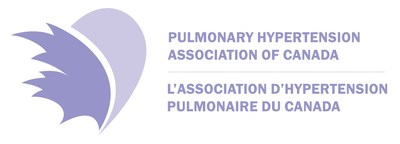85 per cent of Canadians now have publicly funded access to a potentially life-extending treatment for patients with rare lung disease
- Patients living in Alberta, Saskatchewan, Manitoba, Ontario and Newfoundland and Labrador are hopeful Uptravi will soon be accessible all across Canada -
VANCOUVER and HAMILTON, ON, June 12, 2018 /CNW/ - The Pulmonary Hypertension Association of Canada (PHA Canada) and Scleroderma Canada join together in praising the Alberta, Saskatchewan, Manitoba, Ontario and Newfoundland and Labrador governments for following Quebec's lead by providing public funding for Uptravi (selexipag) for the treatment of pulmonary arterial hypertension (PAH). This action stems from the conclusion of pricing negotiations for Uptravi by the pan-Canadian Pharmaceutical Alliance (pCPA). The PAH and scleroderma communities are hopeful that the remaining provinces and territories across Canada will promptly follow suit to ensure that PAH specialists are able to provide optimal, individualized treatment to improve the outcomes for patients living with this potentially fatal disease.

"The voices of the PAH and scleroderma communities have been heard. We commend the provinces of Alberta, Saskatchewan, Manitoba, Ontario and Newfoundland and Labrador, for joining Quebec and making Uptravi accessible through public funding," says Dr. Sanjay Mehta, MD, FRCPC, FCCP, Director of the Southwest Ontario Pulmonary Hypertension Clinic at the London Health Sciences Center in London, Ontario, and Board Chair of PHA Canada. "While these provinces have recognized the highly complex and serious nature of PAH, our work will not be done until the balance of patients in Canada have timely and equitable access to optimal treatment options."
In January 2016, Uptravi became the third new treatment for PAH to be approved by Health Canada in recent years. Later that year, the Common Drug Review (CDR) also recommended Uptravi be publicly funded in Canada.
"We are so pleased to now be able to tell our patients that Alberta has joined the expanding list of provinces providing public funding for Uptravi," says Dr. Dale Lien MD, Professor of Medicine, Director Pulmonary Hypertension Program, University of Alberta. "The severe and progressive nature of pulmonary arterial hypertension means that patients must have timely access to all Health Canada-approved treatments for PAH, in order to receive the individualized care they require to improve and extend their lives."
PAH is a rare but very complex and serious lung disease. It is defined by high blood pressure in the lungs, which leads to enlargement and weakness of the right side of the heart – a type of heart failure. PAH is a common complication of systemic scleroderma (SSc), a chronic hardening and thickening of the skin and internal organs, and can be very severe in patients affected by this progressive connective tissue disease.
"My world was turned upside down following my diagnosis with pulmonary arterial hypertension. On any given day, even with the treatments I am on, the most I can do is take my young children to and from school – I'm lucky if I have the energy to do anything else. My disease not only affects me but my whole family, as I am more dependent on them now," says Ladho S. Panesar-Chugger, PAH patient in Markham, Ontario. "My life depends on adding a third medication to my treatment regime, and my specialist has been recommending Uptravi for many months. As an Ontarian who relies on public funding, I will now finally have access to it. That's my wish for all Canadians like me."
There is currently no cure for PAH and while the prognosis for patients has improved somewhat in recent years, it remains poor despite treatments available in Canada. The average survival in adults following a PAH diagnosis is estimated at only five to seven years, and only three years for those affected by scleroderma-associated PAH (SSc-PAH). This means that patients do not have the time to wait for necessary, potentially life-extending treatment options to be made accessible through public funding.
"Those living with PAH or SSc-PAH do not have time to wait for necessary treatment. Take my mother's experience, for example; she lost her battle with SSc-PAH in November 2017 while waiting for publicly funded access to treatment," says Stephanie Keyes, daughter and SSc-PAH caregiver from Gananoque, Ontario. "As a family, we consider her journey to be her legacy. Our hope is that sharing her story will benefit others who are also pleading for treatments not accessible to them through their provincial drug plans. For many suffering with this condition, these treatments are a matter of life or death."
Today, approximately 85 per cent of Canadians now have publicly funded access to Uptravi. The PAH and scleroderma communities are optimistic that all patients living in Canada who rely on provincial or territorial drug plans will soon have access to Uptravi.
Please visit TakeActionPAH.ca for more information.

SOURCE Pulmonary Hypertension Association of Canada
